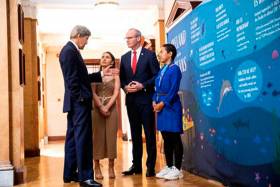Displaying items by tag: Climate Crisis
Coastal Communities Invited to Work with TCD Researchers on Climate Crisis Projects
Coastal communities interested in taking action on the climate crisis are being invited to work with researchers from Trinity College Dublin (TCD) on a locally-led 18-month project.
“LEVERS”, a Trinity-led Horizon Europe education project, is inviting applications from “cross-sectoral alliances” around the country to collaborate on a climate justice project in their area.
The chosen project will ideally be formed by schools, community groups and other organisations within a region, and span a range of ages and demographics.
The winning group will be supported by Trinity researchers and LEVERS partners to create a community project through which learners of all ages will work together towards a sustainable and just future for their area.
The selected group will receive:
- Financial assistance up to €15,000 to realise their project
- Access to expertise in climate change and sustainability education, design thinking and community co-creation
- Professional learning for teachers, youth educators, community leaders and others involved in the project
- Support to design, activate and promote a community project
- Assistance to create a long-term plan for the project beyond the 18-month period.
The call out was launched at an event in Trinity on Wednesday, October 18th, as part of Trinity’s Climate Action Week programme.
LEVERS is a €2.4m Trinity-led education project working with eleven partners across nine countries.
Led by Mairéad Hurley, Assistant Professor in the School of Education, the LEVERS project has been funded by the European Commission, UK Research and Innovation and Social Enterprise Republic of Ireland.
It aims to investigate the potential of localised learning ecosystems which will support community climate responses in nine countries: Ireland, the UK, Portugal, Belgium, Switzerland, Slovenia, Serbia, Greece, and Cyprus.
Dr Hurley says that “as the world becomes increasingly unpredictable, it is becoming ever clearer that we need to move beyond our old ways of planning for the future”.
“We need to break down boundaries and borders if we are to work together for a flourishing future for all. Education has a huge role to play in that, but we also must remember that learning happens in so many settings beyond the walls of a school, throughout our entire lives – and now, more than ever, we need to learn new ways to live together in changing times,”she says.
“The LEVERS initiative is looking to promote a cross-community, intergenerational, localised and creative approach to learning about how to care for our locality and everything within it – including one another,”she says.
Applicant groups must consist of multiple organisations, including at least one educational organisation and at least one community/voluntary organisation or NGO.
Susan Heffernan, Project Manager, Mary Robinson Centre, said that “climate action at community level is perhaps the most empowering way for communities to achieve climate justice and address the issues they face directly”.
“The Mary Robinson Centre is excited to see projects like LEVERS which embolden schools and communities to take a central role in climate justice projects in Ireland.”
Since its launch in March 2023, LEVERS has been consulting with artists, activists, adult educators, biodiversity champions, charities, cultural organisations, community groups, educators, government bodies, local authorities, libraries, NGOs, researchers and scientists working on topics related to climate justice in Ireland, it says.
Over the past four months, the LEVERS team has been carrying out interviews with experts, attending conferences and networking events, as well as hosting three public consultation workshops. The aim of this work was to map climate change education and community initiatives in Ireland, and to understand some of the challenges facing those working in the field.
The insights from these workshops were submitted to the Department for Environment, Climate and Communications’ Climate Conversations Consultation in August 2023, and used to shape this Open Call.
The key findings that emerged among these stakeholders were “a desire for more professional support and networking opportunities, an emphasis on the importance of equity and inclusion in the climate change conversation, and a request for sustainability and climate issues to be more central to all subjects in Irish education”.
For more information on the application process, eligibility, selection criteria and key dates please email [email protected] or visit www.leversforclimate.eu.
Interested organisations may also avail of a free workshop delivered by LEVERS in partnership with Dublin City Council (DCC), on Thursday, November 16th, from 6:30-8:30 pm, which will support applications to this open call and DCC’s Community Climate Action Fund.
More information on the LEVERS project can be found at www.leversforclimate.eu
Inland Fisheries Ireland Welcomes Climate Action Plan
Inland Fisheries Ireland (IFI) says it welcomes the Government’s Climate Action Plan to tackle the growing global climate crisis.
The plan launched yesterday (Monday 17 June), which contains 180 actions to ensure Ireland will meet its 2030 targets for carbon emissions, also sets out how Ireland aims to achieve net zero carbon emissions by 2050.
The plan looks at every sector, including the public sector — with all public bodies set to receive a new climate action mandate to prioritise climate action.
Earlier this year, IFI introduced energy efficient vehicles with a view to achieving a 24% reduction in the C02 emissions from its fleet patrolling inland waterways nationwide.
In addition, IFI says it has implemented a fleet management system to generate additional efficacies.
“This new national plan, together with a new mandate for the public sector offers an opportunity to refocus the philosophy of our organisation,” said IFI chief executive Dr Ciaran Byrne of the announcement.
“As an environmental agency, we are very aware of the critical nature of climate change and the impact it is having on our fisheries resource. We are looking at every aspect of our work to see how we can reduce our environmental footprint.
“The move to ‘green’ vehicles is just one of many changes which we are making to ensure we reduce our overall emissions.”
Others include reducing consumption by half on sea payrolls by introducing modern RIBs as fisheries protection vessel, as well as carrying out patrols by kayak and bicycle where possible.
“We are at a crossroads when it comes to climate change and this plan provides us with a framework to help us make the right choices and build a sustainable future,” Dr Byrne added.
The new Climate Action Plan has not been as warmly received by others, with the likes of the Irish Wildlife Trust agreeing with yesterday’s Irish Times editorial that it shows “little ambition on land use and fails to make the link to biodiversity loss”.
Former US Secretary of State John Kerry has called for immediate action to move to decarbonisation to manage climate change.
The former US senator and presidential candidate was delivering the first keynote address of the Our Ocean Wealth Summit in Cork City Hall on Sunday 9 June.
In his address, Kerry was passionate about the state of our oceans, and he delivered a hard-hitting speech that criticised governments for not being transparent about climate change and called for urgent implementation of better energy policy.
Sponsored by PwC, the Ocean Wealth Summit was moderated by Marine Institute chief executive Dr Peter Heffernan featured contributions from a number of national and international government officials.
Tánaiste Simon Coveney and Marine Minister Michael Creed were actively engaged in discussion with representatives from Small Island Developing States (SIDS) on how governments could work together to broker key solutions to implement the UN Sustainable Development Goals.
Later at the summit, and together with Minister of State for Housing and Urban Renewal, Damien English, they launched the State’s draft Marine Planning Policy Statement.
This is being touted as “a true recognition of the importance of a fully integrated marine planning system across all aspects of marine forward planning, marine development management and marine planning enforcement”.
The Marine Planning Policy Statement is now open for public consultation until noon on Friday 9 August.
Sunday afternoon sessions at the summit were moderated by Dr Tara Shine. These led with a keynote address by European Parliament First Vice President Mairéad McGuinness on the work that Europe is doing and needs to do to effect decarbonisation and promote a greener, cleaner society to support the oceans health and wealth.
Also speaking at the summit was Ireland’s Youth Ambassador to the Oceans, Alicia O’Sullivan, who delivered a powerful address to motivate people in Ireland to see the impact of decisions at local level, which have national and global impact.
The 17-year-old echoed the words of climate activist Greta Thurnberg when she said that urgent action is required as the “house is on fire”.

























































